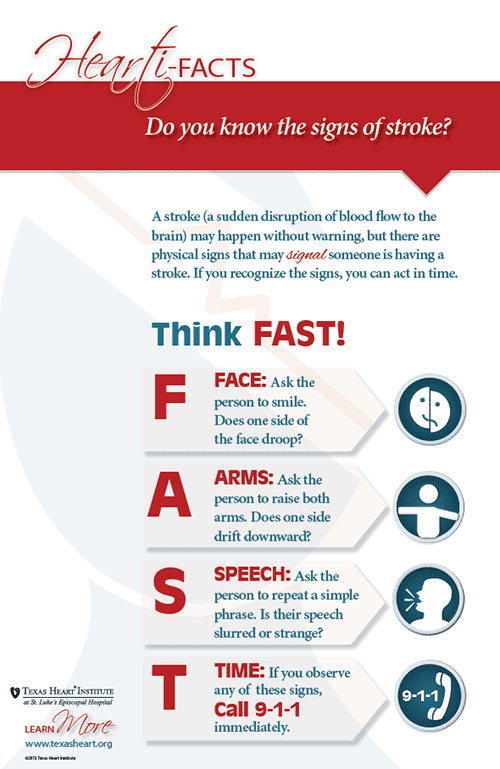
Symptoms typically include
- Weakness or numbness of your face, arm, and leg on one side of your body.
- Sudden blindness or dimming of eyesight, especially in only one eye.
- Loss of speech, slurred speech, or trouble understanding speech.
- A recent change in your personality or mental ability.
- Trouble swallowing.
- Headache (usually severe and comes on quickly) or changes in the pattern of headaches, including migraines.
- Unexplained dizziness, staggering, or impaired balance or hearing, especially if you have the above warning signs.
- Transient ischemic attacks (TIAs).
Transient ischemic attacks (TIAs) are also called "mini strokes." TIAs usually happen when a blood clot temporarily blocks an artery in the brain or neck. This keeps part of the brain from getting the blood it needs. The symptoms of TIAs are similar to those of a major stroke. TIAs may come about quickly and last for a few minutes. A TIA should never last more than a few hours. Since only a small area of the brain is affected, you may only be slightly aware that something is wrong.
TIAs are one of the most important warning signs that you may soon have a stroke. Of those who have had one or more TIAs, more than a third will have a stroke. In about half of these cases, the stroke will occur within 1 year of the TIA.
Time is of the essence in treating a stroke. The first 3 hours are the most important. The National Stroke Association (NSA) reports that 42% of stroke patients wait as long as 24 hours before getting to a hospital (13 hours is the average). According to the NSA, patients usually wait before getting to a hospital because they do not know that they are having a stroke, they think stroke is untreatable so they do not respond, or they choose to wait and see if the symptoms will go away.
Call 9-1-1 right away if you or someone you know has any of the symptoms of a TIA or stroke.
Return to main topic: Stroke
Updated August 2016



